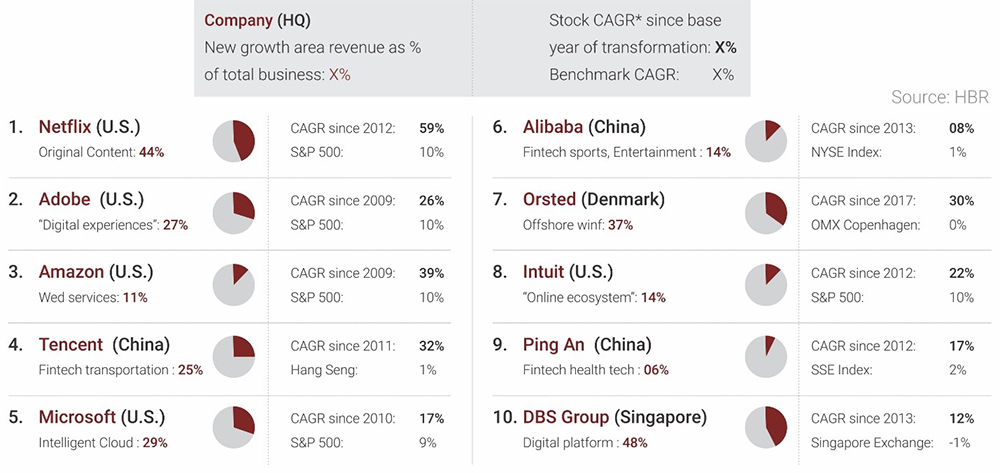The last decade overturned all that was ever known in the global business sphere. For centuries enterprises had been comfortably trading commodities and services for cash. 2010-2019, the decade of disruption storm, shook the business heavens and upended this equation. User and customer experience emerged as the two most-valued aspects for businesses that were able to transform and lead through disruptive innovation. These organizations not only challenged competition in their existing model but were also able to create new revenue streams and markets.
This decade witnessed an unprecedented rise and fall of business empires. Sustainability slumped to 15 years from the previous 60 years and it became harder to foresee budding competitors. Let’s begin with the positives.
Here’s a list of top 10 transformative business that made it to the top:

And then there were the ones that did feel the heat and few that fell from their thrones:
Microsoft almost faltered to a steep decline after the swift innovation-shove by its competitor, iPhone. Satya Nadella’s cloud computing was a lucky long shot that saved the sinking ship right on time.
IBM’s edge in Enterprise IT and CISCO’s crown jewel Networking Gear were beaten bad by Microsoft’s, Amazon’s and Google’s Cloud Computing.
Oracle, a database and enterprise software leader, was relegated to sidelines by innovation behemoths Workday, Salesforce, Microsoft and Amazon.
Enterprise AI and automation led to division of Hewlett-Packard, the juiciest tech pie, into two unappetizing pieces: Hewlett-Packard, and Hewlett Packard Enterprise
Intel had to step down from its heritage chip business, Smartphones were here and Qualcomm, with its licensed chips, toppled Intel from its sky-high throne.
The list of these radical business-buds that paid beyond expectations is extensive. Adding to the above list, few more noteworthy stars were One plus, Alibaba and Ikea.
Small businesses and new players were no more following the footsteps of their giant competitors. Instead, they were carving independent avenues. Customer and user experience emerged as the biggest competitive advantage and investing huge sums to launch a new model became an old-fashioned strategy. Change management and innovation took the spotlight of this stage and strategists veered accordingly. To counterbalance the disruption technologies brought, strategists evolved from:
Foresight to adaptation
Markets to talent
Push to pull methods
Scale to sustained competitive advantage
Strategy forerunner to digital drifters
Process to mindsets
Executor to networker
Let’s face it - Business strategy is not what it used to be. Strategists have no fixed yearly plans now and they are expected to use data-backed insights to arrive at decisions.
But they still need to:
Track business and industry trends
Prepare forecast models
Evaluate performance
Identify emerging market opportunities
Identify threats
Few like to be on the driving seat, do most of the hard work and not remain a mere spectator. If this is you, then business strategy is for you. As a business strategist, your role will be to navigate your organization through obstacle-laden business territories. And a lot will depend on you. You can steer your organization to sustainability and innovation heavens.
Begin with this checklist. To launch your career as a business strategist, you will need:
A Bachelor’s Degree in Business or Masters in Business Administration.
Minimum 3 years of consulting and business strategy experience.
Problem-solving, research, and analytical skills
Exceptional finance skills
Strong verbal and written communication
Certifications can give a significant boost to the profiles of working professionals who are seeking a quantum leap into business strategy profiles.

CredBadge™ is a proprietary, secure, digital badging platform that provides for seamless authentication and verification of credentials across digital media worldwide.
CredBadge™ powered credentials ensure that professionals can showcase and verify their qualifications and credentials across all digital platforms, and at any time, across the planet.

Keep yourself informed on the latest updates and information about business strategy by subscribing to our newsletter.